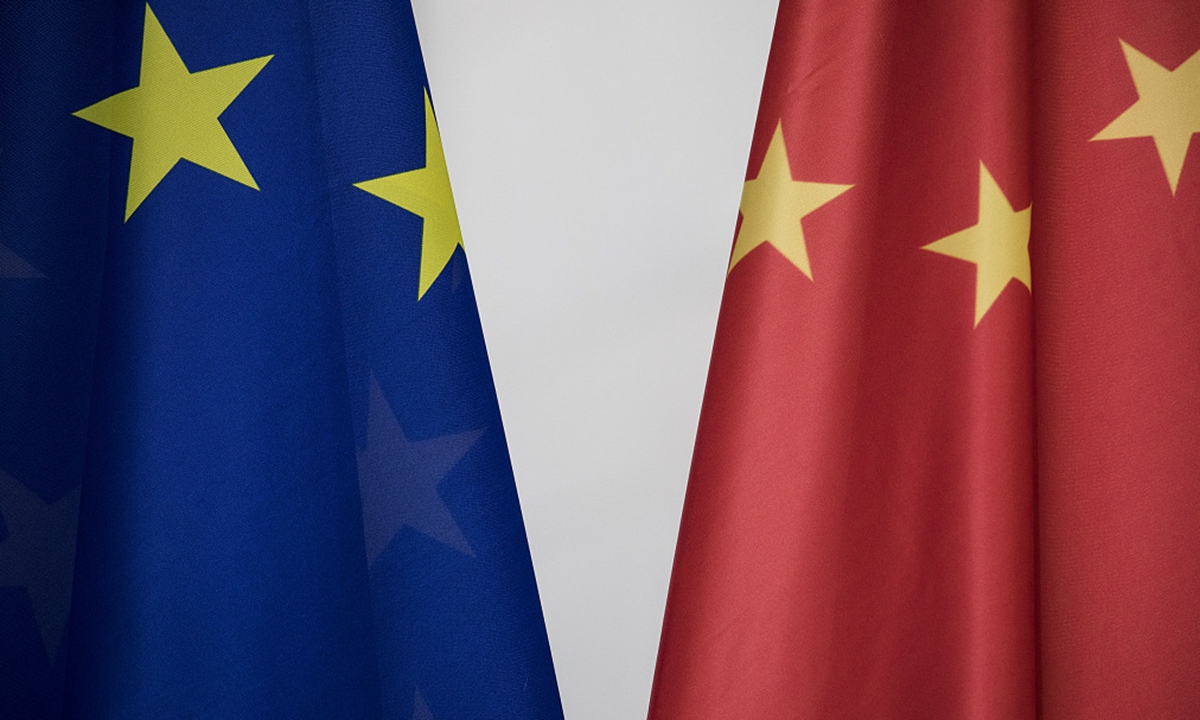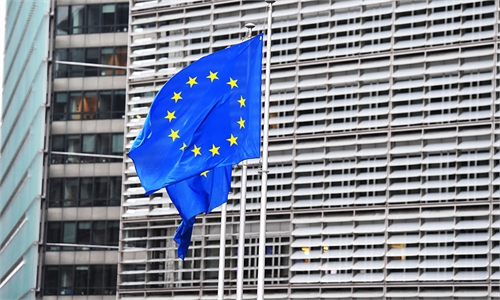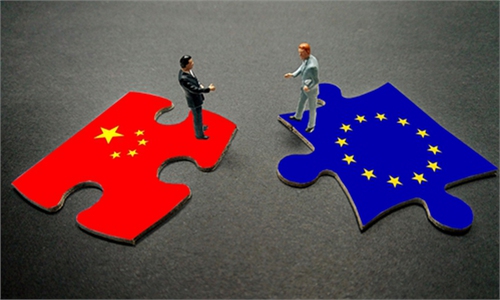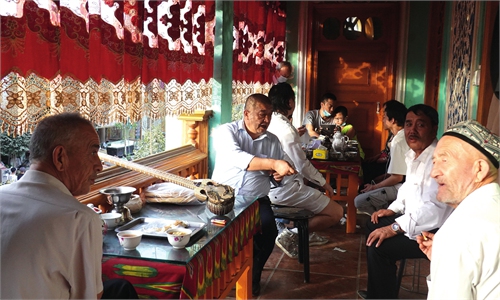NO. 1 on China's sanction list, MEP Reinhard Bütikofer, should have been sanctioned earlier: senior expert

China EU Photo:VCG
Shortly after the European Union signed off on a package of punitive measures against China over alleged human rights abuses, Beijing hit back with tit-for-tat countermeasures by sanctioning 10 individuals and four entities, many of which have spread rumors about the situation in Northwest China's Xinjiang Uygur Autonomous Region and interfered in Xinjiang affairs.
The first on the list is Reinhard Bütikofer, chair of the European Parliament's delegation for relations with China. Who is Reinhard Bütikofer? Wang Yiwei, director of the Centre for European Studies at Renmin University of China, with whom he shared many public debates, may have the best answer. In an exclusive interview with the Global Times on Tuesday, Wang said Reinhard Bütikofer has turned into an anti-China "vanguard" and "China should have sanctioned him long time ago."
Reinhard Bütikofer is a representative figure promoting the "China threat" theory, taking advantage of his position. The 68-year-old German politician is a member of the European Parliament and the Co-Chair of the European Green Party.
Bütikofer, who did not finish his studies on sinology in university, rarely misses a chance to vilify China. In a tweet in 2019, he called China "overbearing." He frequently criticizes China-EU cooperation and relations, as well as China's development.
In January, Reinhard Bütikofer threatened that if China doesn't commit to implement labor rights, the parliament might block the Comprehensive Agreement on Investment deal which was concluded at the end of last year.
After the US announced on January a ban on imports of cotton and tomatoes from China's Xinjiang as well as all products made with them, citing human rights violations and the widespread use of forced labor in the region, Reinhard Bütikofer tweeted that hopefully, the EU would join the US in banning Xinjiang cotton, saying that some European companies are already in the process of making their textiles "Xinjiang free."
Bütikofer is also one of those overseas politicians behind the riots in Hong Kong and actively interferes in its affairs. He supported the illegal "Occupy Central" movement in 2014. In September 2019, Bütikofer visited Hong Kong to meet leading anti-China and separatist activists such as Martin Lee Chu-ming and Joshua Wong Chi-fung, media reported.
He is also among the EU group who visited the island of Taiwan in July 2018 to meet Tsai Ing-wen, according to Taiwan's "foreign affairs" authorities. In April 2020, he pledged his support to Taiwan's bid to join the WHO.
In August 2018, Bütikofer wrote a letter to the Chinese Ambassador to the EU, Zhang Ming, about concerns over China's opposition to the Czech Senate President Milos Vystrcil's planned trip to Taiwan. Zhang said in a written reply that Taiwan is an inalienable part of the Chinese territory and Taiwan affairs are China's internal affairs.
In 2018, Wang was invited to hold a public debate with Bütikofer who left an impression on Wang of "pride and prejudice."
Wang told the Global Times that Bütikofer was a former German leftist with a Marxist-Leninist background. He claimed to have read the Selected Works of Mao Zedong and often quoted Mao to try to "educate" the Chinese. But in fact, he only had a smattering of Marxism-Leninism and Mao Zedong Thought, quoting them out of context. In later years, he was used by the US and NATO as an anti-China vanguard.
"In that debate, Bütikofer claimed that China is now dividing and ruling Europe and China must stick to a one-Europe policy. I immediately asked, 'What Europe is one-Europe? Germany's Europe? The Central Eastern European countries want to cooperate with China, but now you want to block them. Aren't they sovereign states? Why are you forcing them? Do you still want Europe to remain Germany's Europe?'" Wang recalled.
"China is forcing European companies in China to transfer intellectual property" and "China is stealing technology" are other arguments that Bütikofer often made, Wang said. In the debate, Wang responded that the Chinese and German companies signed the treaty to exchange technology in accordance with market principle, in which China lets German cars into its market while Germany transferred some outdated technology to China. Such transfer was based on a contract under German companies' will. "Who is in breach of contract spirit?" Wang asked.
What impressed Wang most was that during the debate, a German participant in the audience couldn't stand it and shouted, "The Chinese are building the Great Wall while the Germans are still in their caves. What qualification do you have to lecture the Chinese?"
"I was very surprised," Wang recalled.
Bütikofer's Marxist-Leninist background had initially made China very friendly to him and he had been invited to visit China several times. However, he had turned himself into an "ideological fanatic," who is willing to act as a standard-bearer against China in Europe and the US, Wang said.
China's sanctions were not "toothless tigers" but aimed at the interests behind politicians like Bütikofer. Once sanctioned, many parties and businesses will stop cooperating with them, said Wang.
"This is also a reminder to other anti-China politicians in Europe and the US that sanctions are not only a great power game played by them, but also by China. If they further harm China's interests, China will not hesitate to add them to the list," Wang said.




